Let’s look at the 3 best memory cards for the Canon 80D, and also what to look for before buying one.
Having a reliable memory card is hands down the most important accessory for your camera.
Why? Because all of your shots and videos are stored there, and if that card goes corrupt, it’s nearly impossible to get the files back.
In this post, we are going to go through absolutely everything you need to know before buying the best memory card for the Canon 80D.
Canon 80D Card Specifications:
- The Canon 80D has 1 x SD card slot
- Supports UHS-I speed cards
- Full HD Video Recording and 7 frames per second burst
So, the 80D accepts 1 SD memory card slot, and supports a maximum speed of UHS-I cards. You can normally use UHS-II, which are faster, but the camera itself can not use the extra speed available. If you’ve never heard about these terms before, we’ll explain the difference below.
If you don’t care about the technical terms and just want something that works the best, look at the 3 best cards we listed right under.
Best 3 Memory Cards for Canon 80D

- SanDisk Extreme Pro 95MB/s UHS-I U3
- Lexar Professional 95MB/s UHS-I U3
- Transcend R95/W60MB/s UHS-I U3
Before going further into the 3 best cards and what makes them great for the Canon 80D, let’s look at what types of SD cards there are.

As you can see from the table above, we have cards that write at 2MB/s, and cards that go all the way up to 90MB/s. This comparison is directly from the SD association.
As of 2019, anything under 10MB/s is considered obsolete, and more or less hard to find.
What speed for the Canon 80D?
- For photographs: At least 10MB/s. The 80D has 24 megapixels so files can get quite big, but this speed is absolutely fine. If you plan on doing lots of wildlife/sports shooting, then think about the 30MB/s speeed. Basically, the U1 or U3 markings will be fine.
- For videos: For Full HD video, 10MB/s (U1 or also known as V10) is alright, but going with U3 won’t hurt.
To put it simply, to get the best performance for photo and video, you want a U3 card for your Canon 80D.
U3 is fast enough for anything you can think of, whether it’s 4K video recording or shooting sports at 7fps.
What about the UHS-I vs UHS-II? Simply put, UHS-II cards can read and write files faster, but unless your camera supports it, you will only see the benefit when transferring the files to your computer.
If you transfer gigabytes of files on a weekly basis, then a UHS-II card might be a smart choice, just remember that the 80D won’t see any benefit from it.
All 3 cards we chose are U3 and very inexpensive.
SanDisk Extreme Pro 95MB/s UHS-I U3
The SanDisk 64GB Extreme Pro 32GB U3 is our favorite card, seeing as it’s inexpensive and provides writing and reading speeds near 90MB/s. It’ll handle the Canon 80D burst mode and Full HD video with ease.
SanDisk is the most popular brand out there, and has been for more than 15 years. We have used it in all of our cameras, as well as for phones and other devices.
It comes in 16GB, 32GB, 64GB, 128GB and 256GB sizes.
You can buy it at Amazon or see more reviews here.
Lexar Professional 300MB/s UHS-II U3
The Lexar Professional 300MB/s UHS-II U3 offers faster speeds for both writing and reading files, but costs noticeably more.
However, we already mentioned that the Canon 80D won’t benefit from it since it can’t take advantage of the extra speed offered by UHS-II (it will act like a UHS-I card), but if you transfer a lot of shots almost every day, you’ll appreciate the much faster transferring speeds to your computer.
Don’t have a memory card reader that supports such speeds? Luckily you get a free Lexar UHS-II reader along this card that will greatly reduce the waiting time. You also get a free downloadable Imaging Rescue software.
It comes in 32GB, 64GB and 128GB sizes. And in case you ever decide to upgrade to a newer model, chances are it’ll support UHS-II so you’re covered.
You can buy it at Amazon or see more reviews here.
Transcend R95/W60MB/s UHS-I U3
The most affordable on our list, yet still UHS-I, is the Transcend 64GB UHS-I U3. In terms of reading speed it goes up to 95MB/s, while for writing the maximum is 60MB/s.
Transcend, just like Lexar above, gives you the option of downloading their free image recovery program and they both work pretty good in most cases. It comes in 64GB, 128GB and 256GB sizes.
You can buy it at Amazon or see more reviews here.
Last Updated on September 14, 2021 by Nick Voorhees
First and foremost, I’m a husband and father. Then professionally I’m photographer, designer, blogger, and Esty store owner. My homebase is near the stunning Wasatch mountains in Utah but I love traveling with my family as part of our homeschooling journey. I also love teaching and helping out others. My faith is one of the biggest aspects of my life and brings be a consistent joy that I haven’t found in anything else. My main blog is BestPhotographyGear.com and I strive to make photography simple for anyone looking to learn or find gear for their individual needs. By nature, I like to study, research, and analyze things and I use that help provide the best advice and reviews I can.




